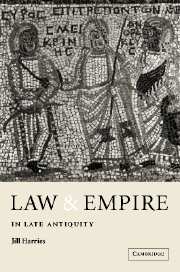Book contents
- Frontmatter
- Contents
- Preface
- Introduction
- 1 The law of Late Antiquity
- 2 Making the law
- 3 The construction of authority
- 4 The efficacy of law
- 5 In court
- 6 Crime and the problem of pain
- 7 Punishment
- 8 The corrupt judge
- 9 Dispute settlement I: out of court
- 10 Dispute settlement II: episcopalis audientia
- Conclusion
- Bibliography
- Index
10 - Dispute settlement II: episcopalis audientia
Published online by Cambridge University Press: 22 September 2009
- Frontmatter
- Contents
- Preface
- Introduction
- 1 The law of Late Antiquity
- 2 Making the law
- 3 The construction of authority
- 4 The efficacy of law
- 5 In court
- 6 Crime and the problem of pain
- 7 Punishment
- 8 The corrupt judge
- 9 Dispute settlement I: out of court
- 10 Dispute settlement II: episcopalis audientia
- Conclusion
- Bibliography
- Index
Summary
Ancient lawyers and modern historians alike have found episcopal hearings difficult to categorise. Because Constantine influenced the course of the history of Christianity in so many ways, the temptation has been, from Late Antiquity onwards, to ascribe especial importance to all aspects of his legislation, as it affected the Church, in particular to his two surviving laws on episcopalis audientia, which appear to give to bishops as judges powers superior to those of their secular counterparts, in that there could be no appeal from a bishop's verdict. But bishops were not only judges, who resembled their secular counterparts in that they tried to adjudicate in accordance with Roman law; they were arbitrators and mediators as well. Constantine's lack of sensitivity to the internal dynamics of Christian communities, as evidenced in other spheres, such as his failure to deal with schism and heresy, was, it will be argued, equally apparent in his infliction on bishops of powers, which it would have been a social embarrassment to wield in the crudely authoritarian fashion envisaged by his laws, and for which, in their extreme form – the imposition of an inappellate verdict on reluctant litigants – there is no significant evidence in the sources at all.
- Type
- Chapter
- Information
- Law and Empire in Late Antiquity , pp. 191 - 211Publisher: Cambridge University PressPrint publication year: 1999
- 1
- Cited by

